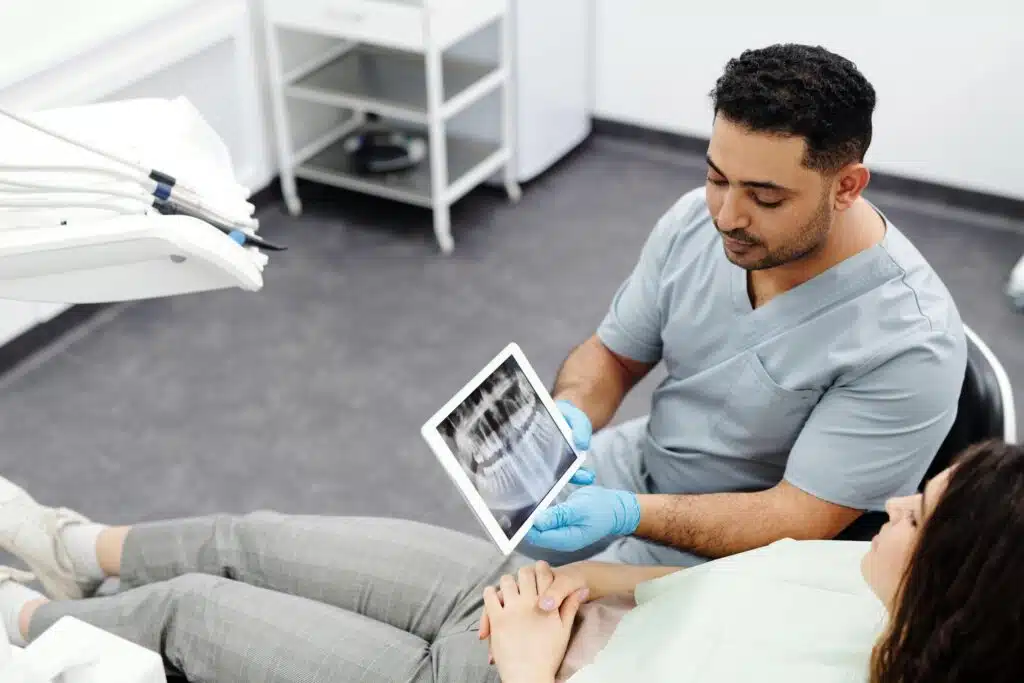Missing teeth can affect your smile, chewing ability, and confidence. Fortunately, dental implants offer a solution to replace missing teeth that look and feel remarkably close to your natural teeth. The success of implants has made them the new standard of care in place of dentures and bridges. However, you may not realize that more than half of implant patients first receive a bone graft that significantly increases the success rate of the implant. Read on to learn more about bone grafts for dental implants.
Trident General Dentistry offers superior dental care in Charleston, SC. Book an appointment with us today!
What is a Bone Graft?
Your natural teeth and dental implants need the support of the surrounding jawbone to withstand the forces of chewing your food. Bone grafting is a minor surgical procedure to replace this bone when it’s missing. The bone graft procedure usually takes place in the dental office using local anesthetic and dental sedation when needed.
A small opening is made in your gum, and then grafting material is placed in the existing bone. Your body uses this grafting material as a scaffold to rebuild natural bone. The surrounding bone gradually absorbs all the grafting material, and you have new bone to support your tooth or implant.
What Types of Grafting Material Are Used?
The high rate of dental bone grafting has contributed to the extraordinary success of implants in recent years. The technique and materials used for both procedures have advanced to offer a safe, predictable, and long-term options to replace missing teeth.
There are several bone graft materials available, including:
· Autograft. This graft uses bone from your body, usually the hip or jaw.
· Allograft. Human bone from a tissue bank serves as the graft material.
· Alloplast. Hydroxyapatite is a naturally occurring bone mineral used to create a synthetic type of glass for bone grafting.
· Xenograft. For a xenograft, processed bone material from another species serves as the resorbable scaffold for new bone formation.
Why Did I Lose Bone?
Your teeth need bone for support, but your bone needs teeth to stimulate bone and keep it strong and healthy. When your teeth contact other teeth or chew food, this places stress on the root of your teeth. This stress transmits into the ligament surrounding each tooth and then into the adjacent bone, where you have tiny cells that make bone.
After tooth extraction, this bone loses the stimulation needed to remain strong and healthy. It quickly begins the process known as bone resorption. The best way to prevent this bone loss is with an implant placement as soon as possible. The more time that passes, the greater the bone loss.
Why Do I Need a Bone Graft Before My Implant?
When you’re evaluated for a dental implant, several factors are considered, such as:
· How your teeth bite together
· How the implant affects your smile and speech
· The adequacy of the jawbone to support the implant.
Several factors determine the amount and density of the bone that will surround the implant. These include:
· How long it has been since the tooth extraction. Every day that passes after the extraction, more bone resorbs.
· If you have a dental infection at the time of extraction. The infection can cause bone loss before the removal of the tooth.
· If you have periodontal disease. Periodontal disease destroys bone and leaves a defect that cannot support an implant.
· If you smoke. Smoking damages bone and may leave you with undesirable bone for implant surgery.
· If you have misaligned teeth. If your teeth don’t bite together correctly, the bone may lack the stimulation to maintain its health.
Am I a Good Candidate for a Bone Graft?
Implants are a common and desirable option for replacing missing teeth. More than half of people receiving an implant also require a bone graft procedure.
You can increase your chances of a successful bone graft and implant surgery by meeting these requirements:
· You practice good oral hygiene.
· You have no untreated periodontal disease.
· You have no unresolved clenching or biting habits.
· You get regular dental checkups and professional teeth cleaning.
· You eat a healthy diet.
· You have no unresolved medical conditions such as high blood pressure or diabetes.
Visit Trident General Dentistry Today
To learn more about how bone grafting and dental implants can restore your smile and oral health, contact Trident General Dentistry today for a consultation.

